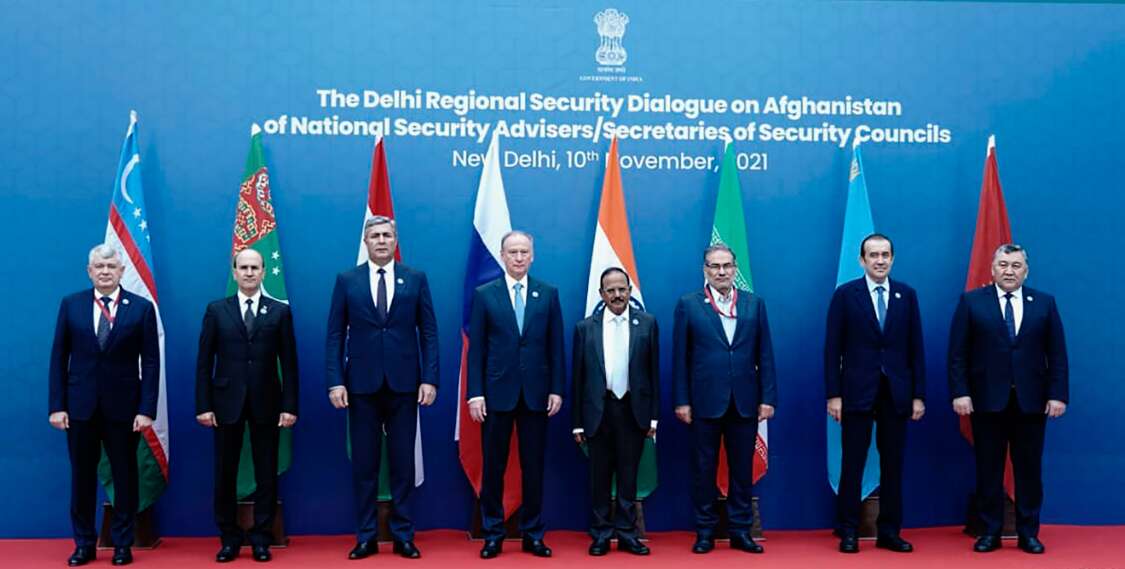A major breakthrough
Convergence of participating countries with India’s standpoint at the Delhi Dialogue indicates its growing role in Afghanistan

The Delhi Regional Security Dialogue on Afghanistan held on November 10, organised at the behest of India, more specifically by the National Security Council Secretariat (NSCS) — inviting NSAs from Iran, Tajikistan, Kyrgyzstan, Kazakhstan, Turkmenistan, Russia and Iran — is being considered a significant event. Pakistan's NSA, Moeed Yusuf, who was invited, had declined to attend, describing India as a spoiler. At the same time, China, after initially keeping its participation in suspense, pulled out at the last-minute, citing, rather unconvincingly, the 'scheduling issues'. Given their stance towards India, the absence of the representatives from the two countries was not altogether surprising. Though it is their own loss as India wrested the initiative from them in Afghanistan. The participants at the meet included: Iran's Rear Admiral Ali Shamkazi, Nikolai Patrushev from Russia, Karim Massimov from Kazakhstan, Marat Mukanovish Imankulov from Kyrgyzstan, Nasrullah Rahmatjan Mahmudzoda from Tajikistan, Charymyrat Kakalyyevich Amavov from Turkmenistan and Victor Makhmudov from Uzbekistan. This shows that these countries not only nurture warm ties with India but are also keen to join hands with India to address terror-linked concerns arising under the Taliban-led Afghan government. These delegates also met with the Indian Prime Minister and held talks with the host NSA and other key security officials of the Indian security dispensation, as also with officials from the Ministry of External Affairs. This apart, the visiting representatives went out for sightseeing to Agra and other places, indicating a relaxed atmosphere in the aftermath of such a heavy-agenda talk.
Coming back to the issue of Pakistan and China boycotting the event, it is more hurting to them as Pakistan was involved deeply in the Afghan affairs, right from lending military and logistical support to helping the Taliban ascend to power as also in the formation of the Afghanistan cabinet, even selecting individual ministers in the process. While China had opted out, it has indicated to continue to follow the developments, but that should be taken as a ceremonial statement — bereft of any substantial meaning
Importantly, this high-level security meeting reviewed and deliberated upon the measures for addressing relevant security challenges and supported the people of Afghanistan. It may be reiterated that in Afghanistan, though under the Taliban-headed government, the ordinary Afghan people are more inclined towards India than Pakistan. Afghans continue to acknowledge their gratitude towards India for its unstinted support to the Afghans in any crisis — be it the grant of scholarships, providing shelter to the Afghan refugees, construction of hospitals and other healthcare facilities in Afghanistan etc.
Significantly, none of the participant countries have so far recognised the Taliban regime. Also, the majority of them have been supporters of the Northern Alliance which is opposed to the Taliban. These countries in the region are also genuinely worried that in the absence of an all-inclusive (representation from all the ethnic groups) regime, Afghanistan faces the possibility of a civil war, and in that eventuality, the country may see bloodletting of perilous proportions. More importantly, many may then slip into the CIS countries, thus, endangering their territorial peace and tranquil. That's the apprehension which looms large.
Against this backdrop, the Indian initiative in holding this meeting assumes immense significance not only from the strategic point of view but also giving India a meaningful role as a key player in the region to take all the regional partners on board to jointly deal with the challenges emanating from Afghanistan. With the participation of these important countries, the meet is not only seen as a ceremonial event but also exhibits India's position in the region as a nation with a focused approach and genuine intentions to thwart terror concerns. This meet is also viewed as an acknowledgement by the regional powers about India's clarity on Afghanistan policy for combating religious radicalisation and terrorism. Security experts, meanwhile, feel that Pakistan missed out an opportunity by skipping this monumental happening which it could have otherwise utilised in its favor. Pakistan's NSA also missed an opportunity of having a 'one on one' meeting with his Indian counterpart in discussing bilateral security issues for betterment of ties. It may be worth mentioning here that possibly peeved by the Indian initiative, coincidentally, on the day Delhi dialogue was convened, the acting Afghan Foreign Minister, Mullah Amir Khan Muttaqi reached Islamabad as a head of a delegation. It was perhaps a signal to India by Pakistan that Afghanistan remains closer and warmer to Pakistan despite Indian initiatives. The space that Pakistan perceived to be theirs, is now with India, and with this Delhi Regional Security Dialogue, India's credibility in the region stands conspicuously enhanced.
In the meantime, some Afghan watchers feel that India should open its diplomatic mission in Kabul and its consulates in other places. This idea, however, seems premature as with an ever-increasing trend of ISIS (K) and fringe elements of Taliban, possibly at the prompting of Pakistan's ISI, Indian missions can be targeted to sabotage its presence. However, all the CIS states which had participated in the November 10 dialogue, have kept their missions in Afghanistan open, though they are yet to recognise the three-month-old Taliban regime. Apart from the India-sponsored regional dialogue, it would appear that all the participating nations are convergent with India on the specifics of their plan. This is seen as heartening by the security and geo-political analysts watching this region. This is possibly a good breakthrough by India.
The writer is a retired IPS officer, a security analyst and a former National Security Advisor to the PM of Mauritius. Views expressed are personal.



